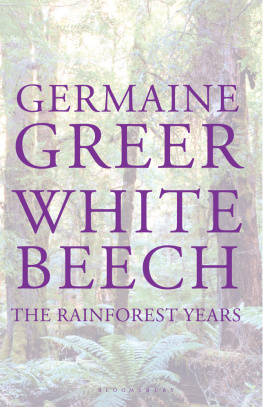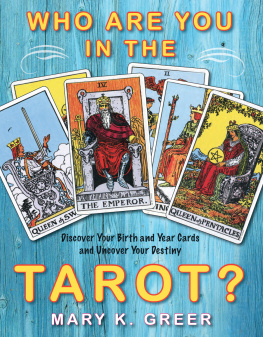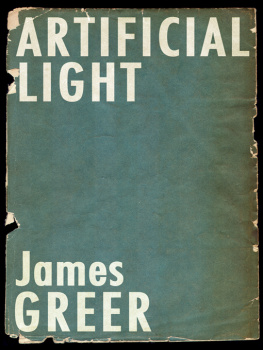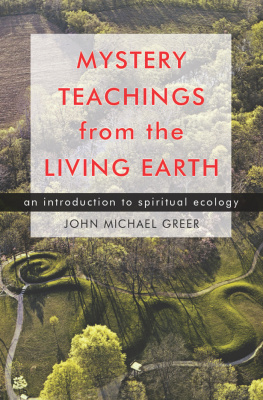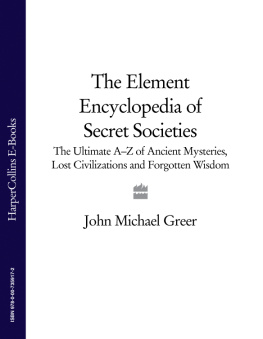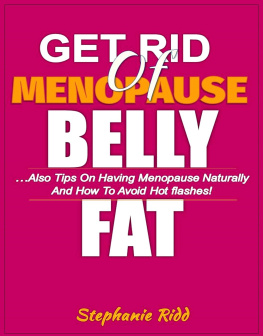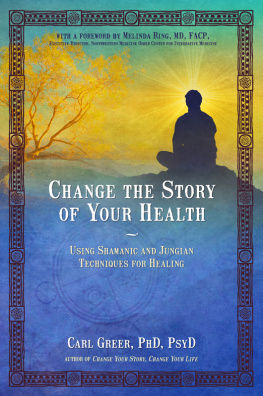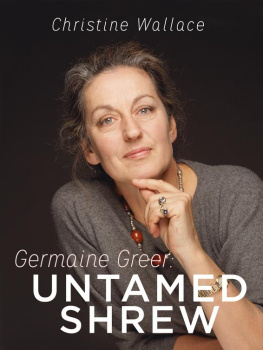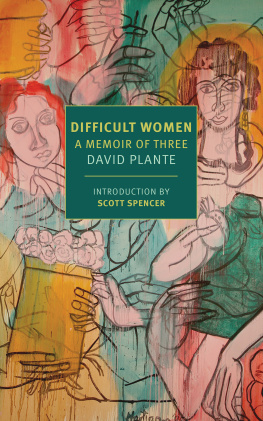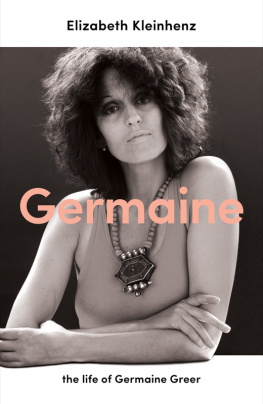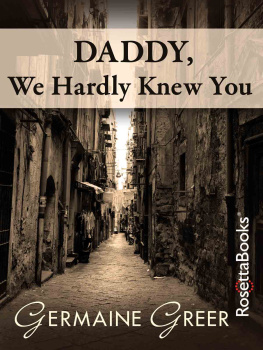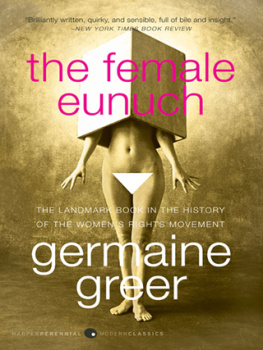THE CHANGE
For Ann and Julia
(still)

Contents
The author and publishers thank the following publishers and literary representatives for permission to quote copyright material.
Elizabeth Bishop: to Farrar, Straus & Giroux, Inc. and Chatto & Windus for the poem One Art from Poems (Chatto & Windus, 2011). Reproduced by permission of The Random House Group Ltd. 2011
Helene Deutsch: to W. W. Norton & Co. for extracts from Confrontations with Myself: An Epilogue (1973); to the Institute of Psychoanalysis, London, for extracts from The Menopause published in the International Journal of Psycho-Analysis, 65 (1984). Reprinted by permission of Curtis Brown Ltd, Nigel Nicolson, 1931
Emily Dickinson: Harvard University Press for poems from The Poems of Emily Dickinson, edited by Th omas H. Johnson, Cambridge, Mass.: The Belknap Press of Harvard University Press, Copyright 1951, 1955 by the President and Fellows of Harvard College. Copyright renewed 1979, 1983 by the President and Fellows of Harvard College. Copyright 1914, 1918, 1919, 1924, 1929, 1930, 1932, 1935, 1937, 1942 by Martha Dickinson Bianchi. Copyright 1952, 1957, 1958, 1963, 1965 by Mary L. Hampson
Rosemary Dobson: to Curtis Brown (Aust) for an extract from Amy Caroline from Collected Poems, Rosemary Dobson, 1991
Barbara Evans: to Pan Macmillan for extracts from Life Change: A Guide to the Menopause, Its Effects and Treatment, 4th edition (1988). Reproduced with permission of the Licensor through PLSclear
Lillian Hellman: to Hachette Book Group for extracts from An Unfinished Woman (Penguin Books, 1973)
Elizabeth Jennings: to Pan Macmillan for the poem Let Th ings Alone from Relationships; to David Higham Associates for the poems Growing and Accepted from Growing-Points
Doris Lessing: to Penguin Random House for extracts from The Summer Before the Dark (Jonathan Cape, 1973)
Patrick McGrady: to Weidenfeld & Nicolson, Ltd, for extracts from The Youth Doctors (Arthur Barker, 1979)
Ann Mankowitz: to Inner City Books, Toronto, for extracts from Change of Life: A Psychological Study of Dreams and the Menopause (1984)
Gabriel Garca Mrquez: to Penguin Random House for extracts from Love in the Time of Cholera (1989)
Willa Muir: to Enitharmon Press for the poem Where is my love, my Dear from Laconics, Jingles & Other Verses (1969)
Iris Murdoch: to Penguin Random House for extracts from Brunos Dream (Vintage, 1987)
Linda Pastan: to W. W. Norton and the Jean V. Naggar Literary Agency for poems from The Five Stages of Grief (1978)
Margaret Powell: to David Higham Associates for extracts from The Treasure Upstairs (Peter Davies)
Vita Sackville- West: to Penguin Random House for extracts from All Passion Spent (L. & V. Woolf, 1931). Reprinted by permission of Curtis Brown Ltd, Nigel Nicolson, 1931
Stevie Smith: to James MacGibbon for extracts from The Collected Poems of Stevie Smith (Penguin Books, 1985)
While every effort has been made to trace copyright holders, this has not been successful in all cases; any omissions brought to our attention will of course be remedied in future editions.
The idea of eliminating menopause came not from women but from men who thought that the cessation of ovulation was a premature death, a tragedy. The years of the change are certainly difficult for some of us to traverse, so there have always been women who ask for help from male professionals during the climacteric. The help that was given was, at first, the only treatment doctors had for anything, namely bleeding and purging, accompanied by an array of ineffectual medications, some of which continued to be marketed at high prices for hundreds of years as Dr So-and-sos female pills, setting a pattern for the exploitation of the little health of ladies that persists to this day. Next the learned gentlemen tried to reactivate menstruation from another site, by opening issues of blood; from this they proceeded to hysterectomy and castration, in the hope of correcting the mental derangements that were thought to accompany the decline of the catamenia, as the menstrual losses were called. No sooner had electricity been discovered than they began thrusting electrified rods into the uterus; one of the first uses for X-rays was to bombard the ovary with them and so kill it. Marie Curie had not long discovered radium before radium rods were being inserted in the vagina.
There was always another school of thought that held that the climacteric was in truth less stressful than other periods in the travailed female life course. As long as childbirth was unavoidable and dangerous, this was clearly true. Partly because there was a disproportionate number of virgins over the age of fifty, climacteric problems became associated with old maids, adding greatly to the prejudice against them and against menopause. By the mid-nineteenth century, public awareness of a menopausal syndrome was greatly complicating the problems that the middle-aged woman had no option but to face. The irrational certainty that the womb was the real cause of the ageing womans anger or melancholy effectively obscured the inconvenient possibility that she had genuine grounds for feeling angry or sad. There was no shortage of women who obligingly internalised their own rage and produced a bewildering array of symptoms, many of which responded to hideous invasive procedures that can have had no genuine therapeutic function. Obstacles to negotiation of what is in fact a stressful stage in female life began to pile up, and menopausal distress accumulated around them.
In the guise of immense chivalrous sympathy for women destroyed by the tragedy of menopause, a group of male professionals permitted themselves to give full vent to an irrational fear of old women, which I have called, from the Latin anus, meaning old woman, anophobia. These are the men whose names continue to appear on hundreds of learned papers every year, elaborating the possibilities of eliminating menopause and keeping all women both appetising and responsive to male demand from puberty to the grave, driving the dreaded old woman off the face of the earth for ever.
There are positive aspects to being a frightening old woman. Though the old woman is both feared and reviled, she need not take the intolerance of others to heart, for women over fifty already form one of the largest groups in the population structure of the Western world. As long as they like themselves, they will not be an oppressed minority. In order to like themselves they must reject trivialisation by others of who and what they are. A grown woman should not have to masquerade as a girl in order to remain in the land of the living. Capitulation to pressure to do just that has resulted in a gallery of grotesques whose gallant refusals to age are the staple of our gossip magazines. The most spectacular of these was the late Doa Mara del Rosario Cayetana Fitz-James Stuart y de Silva, 18th Duchess of Alba de Tormes. A series of phantasmagoric cosmetic operations had radically changed her appearance before, in October 2011, aged eighty-five and with a valve installed in her brain in an effort to slow down her mental decline, she made 61-year-old Alfonso Diez her third husband. The wedding was recorded for posterity in photographs of the Duchess dancing a barefoot flamenco at the wedding. Diez, who had signed a prenuptial agreement renouncing any claim to a share in her 2.2 billion fortune, was by her side when she died in November 2014.


